Vienna University of Economics and Business
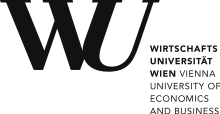 | |
| Type | Public |
|---|---|
| Established | 1898 |
| Rector | Edeltraud Hanappi-Egger |
Administrative staff | 2,239 (2014) |
| Students | 22,825 (2014) |
| Location | Vienna, Austria |
| Campus | Urban |
| Affiliations | AMBA, EQUIS, CEMS, EFMD, EUA, AACSB, PIM |
| Website | www.wu.ac.at |
The Vienna University of Economics and Business (German: Wirtschaftsuniversität Wien or WU) is the largest university focusing on business and economics in Europe and, in terms of student body, one of the largest universities in Austria. It has been ranked as one of the best business schools in Europe.
History
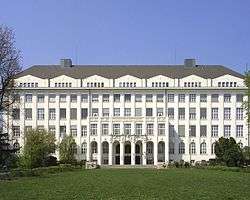
WU was founded on October 1, 1898 as k.u.k. Exportakademie to provide professional training to future businessmen and thus stimulate the Austro-Hungarian empire's economy. From humble beginnings as a professional school, it quickly grew to become an important institution, which was awarded the status of a fully-fledged Hochschule (an educational institution equivalent to a university, but specializing in a certain field such as technology or business or art) in 1919. At that time, it was renamed to Hochschule für Welthandel. The course of studies leading to the academic degree of Diplomkaufmann provided training preparing for the export and banking businesses and was very practical, comprising courses in business administration, economics, law and others. In 1930, the Hochschule für Welthandel was granted the right to issue doctoral degrees.
After World War II, the Hochschule für Welthandel increased its breadth in research. It started to become a very important institution in Austrian society at that time; most Austrian managers and many politicians received their university education here. From 1966 onward, it began to offer a more theoretical course of studies in economics. In 1975, it was renamed to Wirtschaftsuniversität Wien. At the same time, the number of students began to increase dramatically. In 1983, it moved to a campus in Vienna's 9th District. Due to further increasing student numbers during the 1990s the campus became too small. As a consequence, new premises had to be built in Vienna's 2nd district. The new Campus WU opened in October 2013, next to the Vienna Fair Ground.
WU Today
Today, WU has more than 20,000 students and over 400 researchers and teachers, among those about 90 full professors. It increasingly draws students from outside Austria, mostly from Central and Eastern Europe. Most of the faculty are of Austrian or German nationality.
New campus
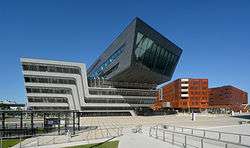
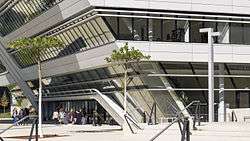

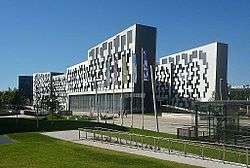
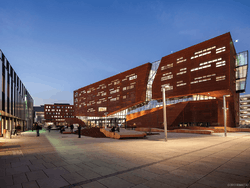
The new location is dubbed "Campus WU" and had its groundbreaking ceremony in October 2009. Close to the Prater public park, and next to the exhibition centre of Vienna, the campus features 6 main building complexes resting on approximately 25 acres (10 ha). The master plan was created by BUSarchitektur under the guidance of the architect Laura P. Spinadel. The buildings of the campus are designed by architectural firms from Spain, the United Kingdom, Germany, Japan and Austria. The dominant element of the campus is the Library & Learning Center, which was planned by Zaha Hadid.
Construction began in June 2010 and paved the way for the largest campus for business sciences in Europe. With a total investment of 492 million Euros and a planned construction period of 3 years, the project was concluded in 2013. Campus WU is situated close to the public transport hub Praterstern and is serviced by two stations of the underground line U2 and a number of buses.
The LLC has five cores, each with a different complex geometry. The core walls are inclined at different angles and so are the corners which are also rounded with different radii. MEVA has developed and uses both standard and special formwork, or a combination of both, to meet the forming requirements for these complex building parts. Steel formwork, for example, is used for rounded corners if required for structural reasons. Trapezoidal areas of inclined cylindrical corner areas are poured with special Mammut 350 wall formwork panels and special designs of MEVA’s circular column formwork Circo are used for the tilted and rounded corners.[1]
The WU moved to the new site in September 2013. The new address is: WU, Welthandelsplatz 1, 1020 Vienna, Austria.
Research
Researchers at WU work in the following fields:
- Business administration and all its branches
- Economics
- Law
- Linguistics, focusing on business communications
- Sociology
- Mathematics and Statistics
- Economics history and economic geography
With students in Austria being free to choose at which university they enroll, WU has become the most popular business and economics university in Vienna and in Austria.
Studies
Due to its large size, WU is able to offer a very broad range of electives which is probably unparalleled anywhere in German-speaking countries. Beginning in Fall 2006, WU has begun to modify its study programs to a bachelor/master/doctor system in order to align them with the Bologna Process. Currently, the following bachelor's degree programs are offered:[2]
- Business, Economics and Social Sciences, with a choice of four different majors:
- Business Administration
- International Business Administration
- Economics & Socio-economics
- Information Systems
- Business Law
WU offers a range of 15 master's degree programs, including several programs taught completely in English.:[3]
- MasterPrograms:[4]
- Export- und Internationalisierungsmanagement°
- Finanzwirtschaft und Rechnungswesen°
- Information Systems
- International Management/CEMS
- Management°
- Marketing
- Quantitative Finance
- Socio-Ecological Economics and Policy
- Sozioökonomie°
- Steuern und Rechnungslegung°
- Strategy, Innovation, and Management Control
- Supply Chain Management
- Volkswirtschaft°
- Wirtschaftspädagogik°
- Wirtschaftsrecht°
°German-taught
Additionally, WU offers the following advanced degrees:
- Doctoral Program in Social and Economic Sciences
- Doctoral Program in Business Law
- PhD in Finance (as part of the Vienna Graduate School of Finance initiative)
- Global Executive MBA (in English; jointly with the University of Minnesota)
- Executive MBA Bucharest (in English)
- Executive MBA PGM (in German)
- Professional MBA (in English)
- Master of Legal Studies (in English and German)
- Master of Business Law (in German)
- LL.M. in International Tax Law (in English)
As at any Austrian or German university, scholars can also achieve a Habilitation at WU.
Furthermore, several courses in continuing education are offered (e.g. in marketing and sales, tourism management, logistics & supply chain management).
Rankings and Accreditations
In 2009 Vienna University of Economics and Business was ranked as one of the best business schools in the German-speaking countries according to Handelsblatt and in 2011 it was ranked 21st in the list of the 392 worldwide leading higher education institutions by the Mines ParisTech : Professional Ranking World Universities. The study obtained the higher education career of the CEOs of the world's leading 500 companies.
WU was ranked 42nd in the "European Business School Ranking 2014" by Financial Times. The Global Executive MBA Programm by WU Executive Academy was ranked 44th in the "Executive MBA Ranking 2015" by Financial Times.[5]
The university's master in international management program was ranked 13th in the "Masters in Management Ranking 2015" by Financial Times.
The university is part of the respected consortium of Europe's leading schools and corporate partners - Community of European Management Schools (CEMS).
WU has achieved accreditation from the London-based Association of MBAs (AMBA), Brussels-based EQUIS and Tampa-based Association to Advance Collegiate Schools of Business (AACSB International). Only 72 business universities worldwide can claim triple crown accreditation by EQUIS, AACSB, and AMBA. [6]
Notable faculty
- Christoph Badelt
- Jesus Crespo Cuaresma
- Nikolaus Franke
- Edeltraud Hanappi-Egger
- Sylvia Frühwirth-Schnatter
- Jan Mendling
- Michael Meyer
- Renate Meyer
- Ewald Nowotny
- Jonas Puck
- Bodo Schlegelmilch
- Peter Schnedlitz
- Ulrike Schneider
- Gerhard Speckbacher
- Neal Stoughton
- Wolfgang Lutz
Notable alumni
- Politicians
- Thomas Klestil (1932–2004), Austrian President (1992–2004)
- Franz Vranitzky (1937– ), Austrian Chancellor (1986–1997)
- Ferdinand Lacina (1942– ), Austrian Finance Minister (1986–1995)
- Hannes Androsch (1938– ), Austrian Finance Minister (1970–1981) and Vice-Chancellor (1976–1981)
- Christoph Chorherr (1960– ), Green Party Spokesperson (1996–1997)
- Madeleine Petrovic (1956– ), Green Party Spokesperson (1994–1996)
- Wolf Klinz, Liberal Party member of the European Parliament (2004–present)
- Petra Steger, Freedom Party of Austria member of the National Council
- Christoph Meineke (1979– ), Mayor
- Andreas Salcher (1960– ),
- Entrepreneurs and Managers
- Peter Brabeck-Letmathe (1944– ), Chairman and CEO Nestlé AG
- Hans-Peter Haselsteiner (1944– ), CEO Strabag SE
- Peter Löscher (1957– ), CEO Siemens AG (2007–2013)
- Dietrich Mateschitz (1944– ), CEO Red Bull
- Wolfgang Porsche (1943– ), Chairman of Porsche AG, Porsche SE and Volkswagen AG supervisory boards
- Hikmet Ersek (1954– ), CEO Western Union
- Claus Raidl (1942– ), CEO Böhler-Uddeholm
- Public Institutions
- Maria Schaumayer (1931–2013), President Austrian Central Bank (1990–1995)[7]
Notes
- ↑ "The New Vienna University of Economics and Business".
- ↑ WU Bachelor Programs
- ↑ WU Master Programs
- ↑ http://www.wu.ac.at/programs/en/master
- ↑ http://rankings.ft.com/businessschoolrankings/executive-mba-ranking-2015
- ↑ http://www.wu.ac.at/press/info/press-release/news/detail/News/wu-receives-aacsb-accreditation-and-completes-triple-crown-accreditation/en/
- ↑ "Schaumayer, Maria in Austria-Forum.org" (in German). Retrieved 2016-09-27.
External links
- Official Website
- WU Executive Academy
- architecture for the new building
- FT Ranking 2009
- Handelsblatt Ranking 2009
Coordinates: 48°12′51″N 16°24′29″E / 48.21417°N 16.40806°E